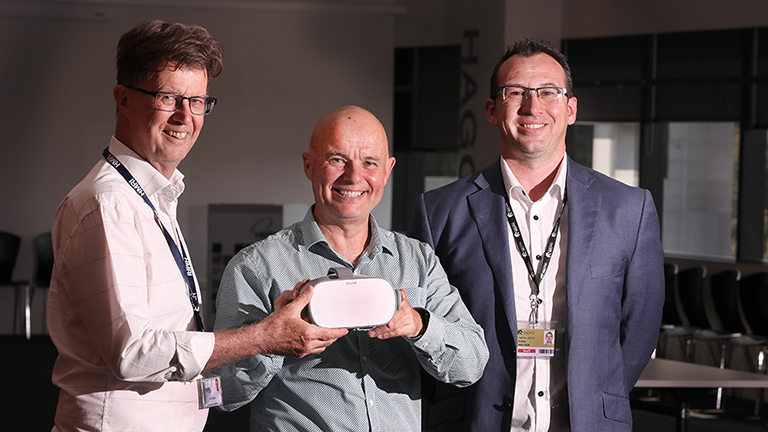
Virtual reality (VR) technology is being used in a world-first training program developed by Hunter-based stroke researchers, aimed at upskilling hospital staff and optimising workflows to get stroke patients treated or transferred faster.
Headsets were recently distributed to seven primary stroke centres in the Hunter New England and Mid-North Coast health regions – John Hunter Hospital in Newcastle, Taree, Tamworth, Armidale, Moree, Port Macquarie and Coffs Harbour.
The software was developed at a cost of $80,000 as a part of a broader health systems intervention known as TACTICS (Trial of Advanced CT Imaging and Combined Education Support) supporting everyone from triage and emergency department nurses to radiographers and doctors.
Announcing the trial on World Stroke Day, Conjoint Professor Chris Levi* from the Hunter Medical Research Institute (HMRI) said the TACTICS’ VR device was designed to bring step-by-step logic and advice to an often time-pressured environment, covering the entire path from patient admission through to discharge.
“Today, we have some of the most powerful treatments in medicine available to treat stroke, and up to 50 per cent of patients, sometimes more, can effectively have a cure if we can see them in time,” Professor Levi said. “Of course, that’s fine if you live near a major stroke hospital – in remote areas, though, it’s often difficult to access these treatments within the required timeframe.
“Also, the hospital emergency environment can become chaotic, with any number of potential delays due to people factors and system factors. TACTICS aims to bridge the evidence-practice gaps and minimise delays and uncertainties.”
The virtual program can take a relatively junior practitioner in a rural setting through the ‘do’s and don’ts’ of stroke care, with regular visual prompts from expert neurologists including Professor Levi. A clock and neuron counter run to emphasise the need for speed.
“It’s a prototype at the moment, and we believe this is the first time it has been tested in stroke, internationally, to implement best-evidence practice. We’re also researching it further to see whether it delivers improvements as part of a package of educational training,” Professor Levi added.
“Very importantly, it also delves into the analysis of brain scanning, which is a dark art for those who aren’t experts in stroke. It demystifies how you interpret a scan and decide who’s right for treatment.”
Professor Rohan Walker from the University of Newcastle (UON) and his team spent six months examining and mapping the best-practice guidelines and marrying them with clinical experience.
“These aren’t easy to put on a page, but a tool like VR gives people an enriched environment to learn about optimal workflow,” he said. “We’ve captured the expertise of our world-leading stroke clinicians and can now avail it to a large audience, anywhere and at any time, in a portable, flexible and engaging package.”
TACTICS is funded by the National Health and Medical Research Council (NHMRC) with partners including Hunter New England Health, UON, HMRI, The George Institute for Global Health, Queensland Health, Apollo Medical Imaging Technology, Boehringer Ingelheim, the University of NSW and University of Melbourne.
Meanwhile, to mark World Stroke Day in Newcastle, Lord Mayor Nuatali Nelmes is hosting a morning tea at City Hall with guest speakers to include John Hunter Hospital stroke neurologist and neuroscientist Professor Neil Spratt, and Hunter Stroke Research Register manager Gillian Mason. They will discuss acute care advancements and telehealth initiatives, along with stroke recovery research at HMRI and how patients can get involved.
With more people now surviving stroke, a raft of trials are being undertaken in the region by HMRI and the UON’s Centre for Rehab Innovation led by former HMRI Director Professor Michael Nilsson.
“We have a real focus on long-term brain repair and recovery with precision-medicine treatments, and support in the community,” Professor Nilsson said.
“Our laboratory studies are showing that the effects of stroke go beyond the acute brain injury, with a cascade of negative changes in the brain, called secondary neurodegeneration. So we’re working to limit the amount of change with treatments such as exercise therapy and low-oxygen post conditioning therapy.
“There’s also multimodal, social experiences like group-based arts, music and theatre that have been shown to stimulate recovery in the chronic phase of stroke.”
Following a successful pilot project in 2019, featured on ABC’s Compass program, StrokeStories will be continued in a larger trial in 2020, where researchers will investigate cognitive function, as well as mood and well-being in people with stroke.
Researchers are also looking at ways to help support people with a rare genetic condition that causes stroke known as CADASIL. An online survey can be completed at https://redcap.research.uts.edu.au/surveys/?s=JF98MM4KKX
Click here for more information on stroke trials, email strokeregister@hmri.org.au or phone Gillian Mason on 4042 0093.
* Professor Chris Levi is from Hunter New England Health, the University of Newcastle and Sydney Partnership for Health, Education, Research and Enterprise. HMRI is a partnership between the University of Newcastle, Hunter New England Health and the community.